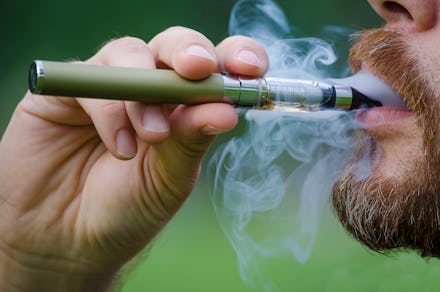San Francisco, the home of Juul, will be the first city in the U.S. to ban e-cigarettes

San Francisco became the e-cigarette headquarters when Juul set up shop in the city back in 2017. Now the city is set to keep the company and its many competitors from selling their products within the borders of the 415. On Wednesday, San Francisco's Board of Supervisors voted to unanimously approve legislation that would ban the sale and delivery of e-cigarettes within the city, according to the San Francisco Chronicle.
The pushback against e-cigarettes comes from one primary concern: keeping kids from accessing them. Use of and access to the devices have greatly increased in the last few years, and teens are some of the biggest customers. According to a survey conducted by the Centers for Disease Control and Prevention (CDC) and the Food and Drug Administration (FDA), use of e-cigarettes by high schoolers rose by 78% between 2017 and 2018 and by nearly 50% among middle schoolers. The National Institutes of Health (NIH) found that more than one-in-three 12th graders reported using an e-cigarette in 2018 after just one in four claimed to use one in 2017.
That growth is driven at least in part by companies like Juul directly and rather explicitly targeting products toward younger users. While the companies hold that they have no intent to target teens, a study conducted by researchers at Stanford concluded that the company's marketing campaigns from 2015 to 2018 were "patently youth-oriented" and often borrowed directly from advertising tactics used by the tobacco industry. The issue even caught the government's attention, resulting in the FDA requesting internal information from Juul to determine why teens seem so attracted to its products. Juul responded by pulling some flavored pods from brick and mortar stores in order to limit access for younger users.
The massive uptick in the number of kids using e-cigarettes is bad, and there isn't much ambiguity about it. As the CDC pointed out, most e-cigarettes contain nicotine, a highly addictive substance that can do damage to brain development in adolescents and young adults. The NIH found that smoking during adolescence can increase the risk for developing psychiatric disorders, cognitive impairments and attention deficits later in one's life. Juul is no exception to the rule, as a single pod contains the same amount of nicotine as an entire pack of cigarettes. While a user is supposed to get 200 puffs out of a Juul cartridge, there is nothing to regulate a person's use other than self-control.
The rise of e-cigarettes — particularly Juul, which owns more than 70 percent of the market — has marked a massive reversal of a successful effort to curb smoking among teens and young adults. The CDC reported in 2016 that cigarette use among high-schoolers was at an all-time low, the result of decades-long, government-backed campaigns designed to raise awareness of the health risks associated with cigarettes. Now there is evidence to suggest that kids who start with e-cigarettes are more likely to try standard cigarettes, according to a study published in Nicotine and Tobacco Research. The situation has become bad enough the Surgeon General has declared youth use of e-cigarettes a health epidemic.
Of course, banning e-cigarettes won't just take the products away from kids. It will also limit access for adults who have legitimate reasons to use the devices, including attempting to quit smoking. E-cigarettes are believed to be less harmful than standard cigarettes when used responsibly. Studies have found that vaping can help smokers wean themselves off the addictive substances contained in cigarettes, including nicotine (though they can be addictive as well, especially when consuming cartridges with nicotine). But even though they can be helpful, e-cigarettes should not be mistaken as being healthy. While there is still plenty of research to be done on the products, researchers have already found some troubling evidence. John Hopkins warns that nicotine use from e-cigarettes can raise blood pressure, spike adrenaline and increase heart rates, which raises the risk of a potential heart attack. A study conducted by the Roswell Park Comprehensive Cancer Center also found that e-cigarette users had higher traces of lead, cadmium, pyrene and acrylonitrile in their urine than those who don't smoke.
As use of e-cigarettes rises, more cities and states are likely to take action. While San Francisco is banning the sale of such products outright, Aspen, Colorado prohibits the sale of flavored pods that appeal primarily to teens. As e-cigarette companies continue to build up the market share that the tobacco industry has lost over the years, governments will have to likewise ramp up their efforts to combat them in order to prevent simply starting the cycle all over again.